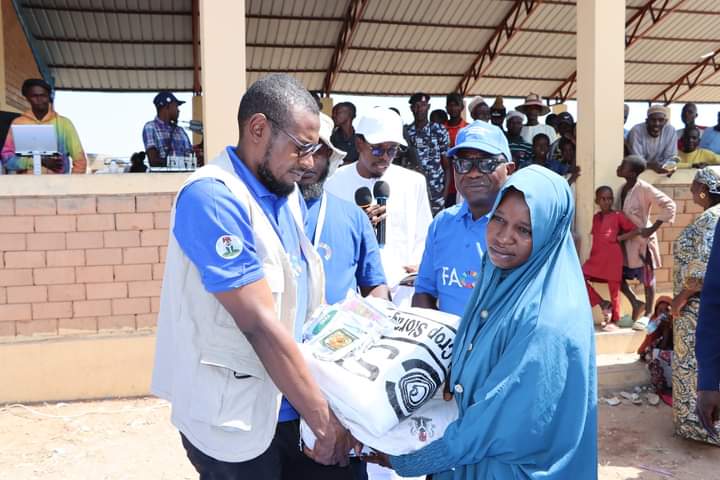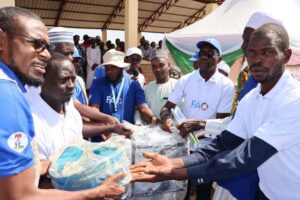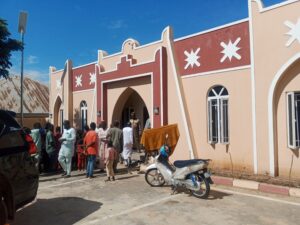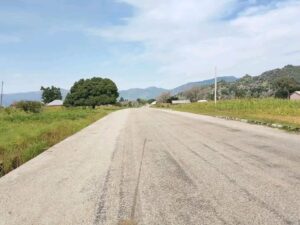
By Tasi’u Hassan
In a significant move to bolster agricultural resilience and enhance food security in the country, the Food and Agriculture Organization of Nigeria (FAO) has launched the distribution of dry season inputs to farmers for the 2024-2025 season in the northeast.
The FAO’s intervention targets 49,000 households across 24 local government areas in Borno, Adamawa and Yobe states, with Adamawa state having 9,800 beneficiaries.

Launching the distribution exercise for Adamawa State in Girei Local Government Area, the FAO Representative ad interim (a.i.) in Nigeria and to ECOWAS, Mr. Koffy Dominique Kouacou, stated, “This year, with the generous financial support of our donors – the Governments of Norway, France, the European Union Civil Protection and Humanitarian Aid Operations (ECHO), the Swiss Agency for Development and Cooperation (SDC), USAID’s Bureau for Humanitarian Assistance (BHA), the UN Central Emergency Response Fund (CERF), and the Special Fund for Emergency and Rehabilitation Activities (SFERA) – FAO is supporting 49,000 households across the Northeast with vital agricultural inputs to help them rebuild their livelihoods”.
World Children Day: Adamawa Children Advocate for School Transport, End To Corporal Punishment.
Adamawa Govt, COCCAN Launch Climate Change Sector Working Group.
The inputs include assorted vegetable and cereal seeds, such as maize, rice, amaranth, cabbage, carrot, onion, and tomato, among other inputs.
He explained, “In Adamawa State, our intervention will directly benefit 9, 800 households across six LGAs: Girei, Madagali, Mayo Belwa, Mubi North, Numan, and Song.
“These communities will receive essential inputs such as seeds, fertilizers, and solar-powered
water pumps. We aim to enable these communities to start dry season farming, which will help them feed their families as well as restore their livelihoods.
“Furthermore, these farmers will undergo capacity-building training in good agronomic practices. By doing so, our goal is not only to address the immediate food insecurity but also to pave the way for sustainable income generation and resilience-building among supported communities”.
He pointed out that the factors responsible for their intervention include the significant impacts of the global trends in the world (climate change, particularly the dry spells, devastating floods and other crises), compounded by other factors such as inflation, among others, leading to the rising prices of essential agricultural inputs, food and increased costs of essential services.
Represented by Luc Leger Manga, Emergency Programme Specialist Area/ Coordinator, Mr. Koffy Kouacou, noted that “During this recent Cadre Harmonisé food security analysis presentation on November 1, 2024, in Abuja, it was shown that the Food insecurity situation remains challenging and affects currently more than 25 million; projections estimate that between June and August 2025, 33.1 million people across Nigeria could face food insecurity—a
sharp increase of 8 million people from current figures”.
These revelations, he said, have reignited FAO’s commitment to supporting Nigeria in enhancing the resilience of vulnerable households, especially in regions experiencing conflict and insecurity challenges, climate shocks, and economic pressures.
The FAO representative, who said that the launch represents a crucial step in their shared commitment to strengthening agricultural resilience across the Northeast, recalled that this is the second event of its kind in this year, when FAO displayed its commitment to restoring and strengthening the livelihoods of the targeted rural populations.
The Adamawa state governor, Ahmadu Umaru Fintiri, represented by his special adviser on food security, Dr. Dishi Khobe, appreciated FAO for the laudable people-oriented tasks it has been undertaking in the state, and urged for more.
“The FAO has been in the business of supporting households in many facets of its endeavours and it is our wish that this tremendous relationship being enjoyed in the state lasts through time”, the governor said.
The representatives of the Girei Local Government Chairman and the District Head of Girei commended FAO for its consistent support to farmers in the state. They urged the beneficiaries to use the inputs judiciously, warning them against selling them.


